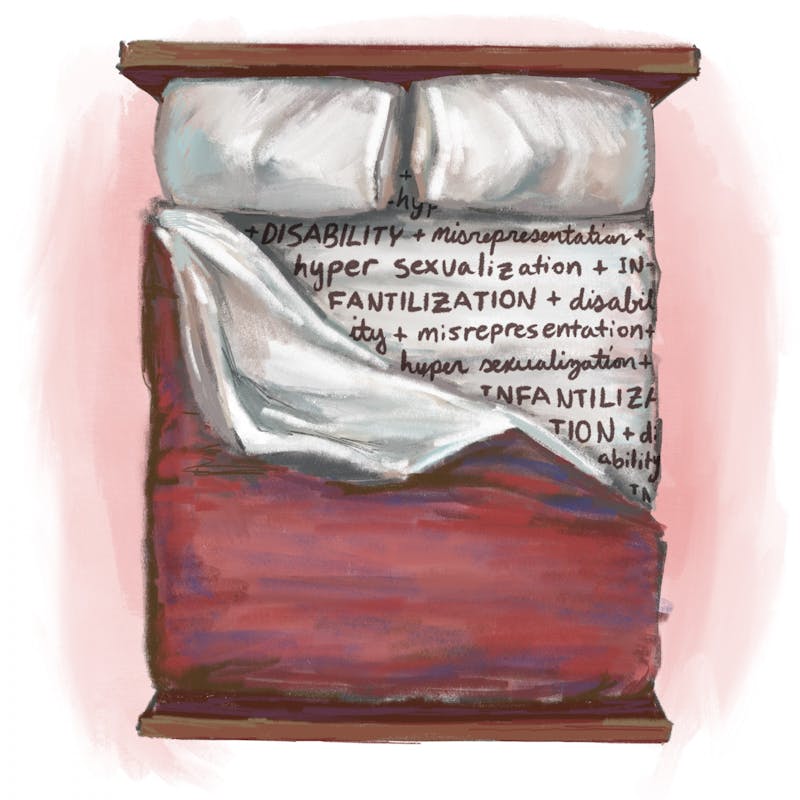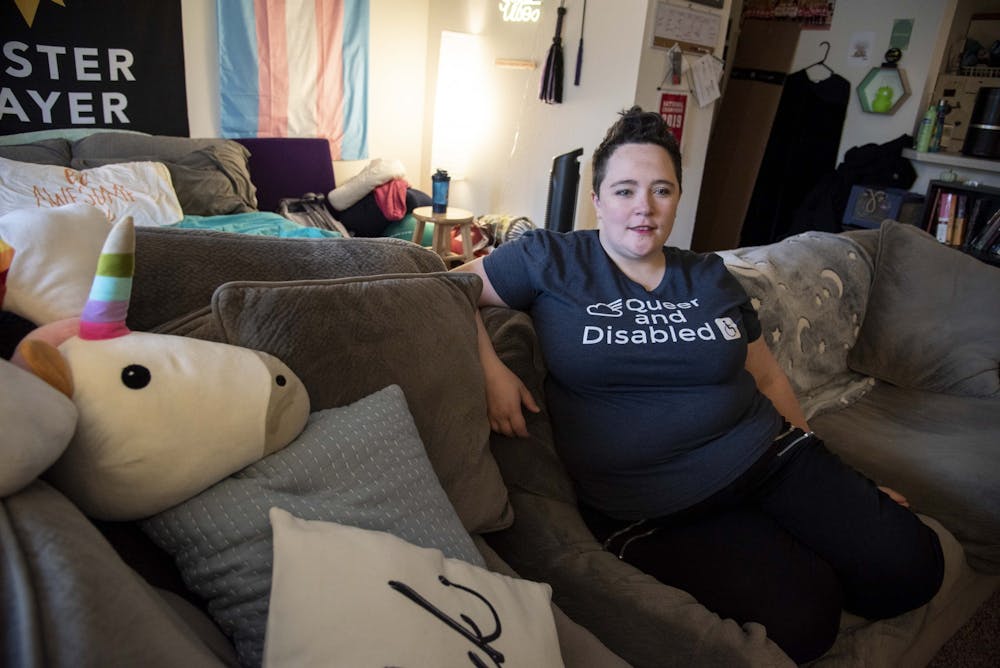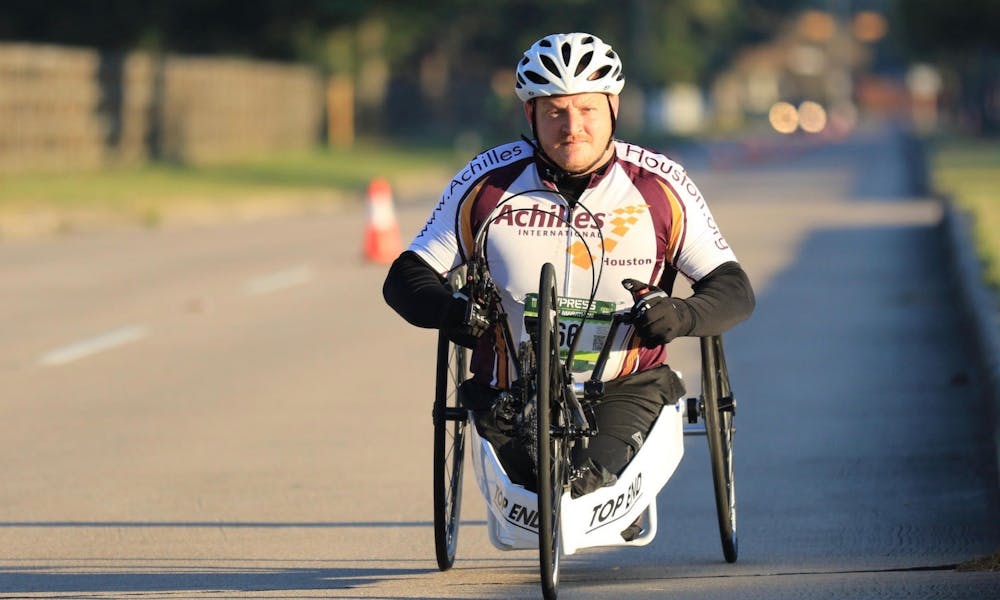
Historically, there has been a lack of education and discussion on disability and sexuality, and there remain few evidence-based studies in the field.
Image By: Max Homstad
Historically, there has been a lack of education and discussion on disability and sexuality, and there remain few evidence-based studies in the field.
Image By: Max HomstadSexuality is often overlooked and not taken into consideration for people with disabilities — Kirsten Schultz has experienced this firsthand.
Schultz is a genderfluid, pansexual Madison-based sex educator, writer and activist. They were diagnosed with Systemic Juvenile Idiopathic Arthritis in 1993, and have since tacked on fibromyalgia, psoriasis, patellofemoral arthralgia, anemia, scoliosis, asthma, post-traumatic stress disorder diagnoses, amongst others — all of which contribute to their chronic pain.
And every relationship they’ve had has been impacted by it, in small and big ways, Schultz said — from working to daily functions to how emotions are regulated and more.
Repercussions of missing representation
For Schultz, communication is essential.
There’s more for partners to know when they are in a relationship with a person with a disability, according to Schultz, like levels of pain or energy, when positions may need to be changed or needing help tying a pair of shoes.
Because individuals might need assistance with tasks that are perceived as simple, like tying shoes, it can bring about feelings of shame.
“It can be hard to deal with the ever-changing notion of the relationship,” Schultz said via email. “Some days, partners may be equal. On other days, one might have to do more of the physical things while the other provides more emotional support.”
The shift from an equal partnership to having someone act as a caregiver is hard to overlook, Schultz elaborated. Add on the financial stress of dealing with medical appointments and an inability to work for periods of time, and it's a lot for a couple to go through.
But working through those feelings can be difficult due to the absence of representation; historically, there has been a lack of education and discussion on disability and sexuality, and there remain few evidence-based studies in the field.
Lisa Yee, a local sex and relationship therapist, traced the history of silence on the subject back to U.S. colonial times.
“We don't talk about it, don't acknowledge it,” Yee said. “It's like our puritanical beginnings in America: don't talk about sex. And it's a shame. Just because someone is disabled doesn't mean that they don't have sexual needs like any other human being, right?”
When Schultz noticed this lack of discussion around sex for people with chronic illnesses and disabilities — or the acknowledgment that this demographic had sex at all — they decided to change that.
In 2015, they began tweeting #ChronicSex. It spiraled into its own organization, breaking open the dialogue on how quality of life is affected by disability and chronic illness, specifically focusing on self-love, self-care, relationships, sexuality and sex itself.
Even before all the diagnoses, Schultz was interested in sex. They had a stash of condoms in their locker throughout school and would go with people to Planned Parenthood to get testings. In middle school and high school, students would come to them to ask sex-related questions, Schultz said.
However, it took becoming a sex educator in 2015 for them to be able to accurately explain their experiences — and even request the right treatments from doctors.
“I started dealing with sexual issues as a part of my now-laundry list of diagnoses,” Schultz said. “My doctor didn't know what to do with the pain I was having. It really came out of necessity for me.”

Kirsten Schultz, above, is a genderfluid, pansexual Madison-based sex educator, writer and activist.
A learning opportunity for society
Education on sexuality is not only important to folx with disabilities, though; it’s a potential source of growth for everybody, according to Mitchell Tepper, one of the leading sex educators and counselors in the nation.
There needs to be a societal attitudinal shift, he said.
“People are not seeing people with disabilities as potential partners and potential sexual partners,” Tepper said. “I think many people with disabilities have known what it's like to be stuck in the friend-zone. It takes a lot of confidence to express that you don't want to be there and that you don't have to be there.”
Tepper’s work emphasizes helping both people with disabilities and health professionals grasp the full potential of sexual response and expression post-injury or illness. He himself has experienced chronic health issues, growing up with Crohn's disease, and also physical disability — he lost the ability to walk after he broke his neck and sustained a spinal cord injury.
Fortunately, Tepper was able to find a silver lining. He stated that though folx with disabilities often take longer to hit romantic milestones — like first kiss and first intercourse — it can translate to more compassionate partnerships.
“When you're forced to really learn and understand sexuality, you learn things that people never learned when they could just get by,” Tepper said. “Sometimes I say, ‘You don't have to break your neck to learn how to be a great lover.’ You can, but you don't have to — you could just learn from me.”
Jeff Chafin is a traumatic above-the-knee amputee who suffered severe abdominal injuries by way of a motorcycle accident. After complications in the ICU, he had a five percent chance of survival. He beat those odds.
“They said I was swollen up like the marshmallow man,” Chaffin said in an email. “As I am sure you can imagine, I did not anticipate much of sex life.”
After months of rehabilitation and physical exploration, he experienced exactly what Tepper explained: a lot of friend-zoning.
“Women avoided me — as soon as they saw the wheelchair, it was like I could hear the snickers and the eye rolls,” Chaffin said. “When I would find someone that would at least talk to me, there would be nothing more beyond ‘Hi, Jeff,’ if we crossed paths.”
It can be damaging, according to Tepper and many concurrent studies, on micro and macro levels.
“When they're looking for that connection with other people and they don't have it, people [with disabilities] feel like they're not worthy and capable,” Tepper stated. “They carry around this idea that this isn't available for me.”
Dating online has pros and cons, according to both Schultz and Chaffin.
Schultz explained dating on apps can be particularly difficult for those who are visibly disabled, like those in wheelchairs. Many messages are “enraging” to Schultz, as they tend to be ableist, patronizing, invasive or all of the above.
Contrarily, Chaffin met his now-wife online after his accident.
“She didn't seem to care about any of it,” he said. “She was in Michigan and came down for a week — it was the best week of my life. We eventually got married and had two kids!”
Educating sexuality
Along with being overlooked as potential partners, folx with disabilities often get asked highly personal, invasive questions, according to Schultz. Sometimes mobility equipment, like a wheelchair or cane, is seen as an “invitation” to pry.
“I've been asked if my genitals work and if I do any work during sex or just lay there — even while waiting in line at an airport or to get coffee,” Schultz said. “There's so much interest in the abilities we may or may not have during sex that the greater lack of conversation about sex and disability floors me.”
Schultz stated that some of this insensitivity can stem from media depictions of folx with disabilities: they’re portrayed as sexually inappropriate or as “the best friend,” there to lift people up by reminding them their lives aren't as bad as others. The latter is called inspiration porn, coined by the late comedian, journalist and disability rights activist Stella Young.
“Disabled people aren't a monolith,” Schultz said. “We're [not] all asexual or all sexually promiscuous. Like any other marginalized group, we deserve to be depicted in the wide range of roles we play in daily life.”
So how do we make this change, to attitudes, culture and representation? Yee says it’s elementary — literally.
“It starts with educating our children differently about sex and not just how our bodies function, and about pleasure,” Yee said. “Sometimes it's just a very biological thing, which is good but not enough.”
While University Health Services is not doing specific work in the field, they continually self-reflect on how they are — and are not — cultivating accessibility, culturally-informed services and advocacy in all their services, according to Jenna Wiedman, one of UHS’s mental health providers.
“We attempt to make adjustments as limitations are discovered,” Wiedman said. “There is still growth to be done to increase inclusion and representation of people with disabilities in general sexual education.”
Part of this is including topics of sexuality and consent in sexual education for people with and without disabilities at all ages, Wiedman explained. But it also means accepting awkward situations as they arise.
“Perfectionism in sex doesn’t usually make things sexier,” Wiedman said. “Accepting and letting go of awkward moments will likely make sex more enjoyable.”
Schultz is hopeful thanks to sex educators and new generations entering the conversation. As a result, they said, society is really beginning to talk about what sexuality means.
“College students and younger folx are so much more in tune with questioning the world around them and finding ways to be who they want and need to be than I was a decade ago,” Schultz said. “The level of activism is growing and it makes me feel so much more comfortable to be who I am as a queer, genderfluid, disabled person.”

After months of rehabilitation and physical exploration, Jeff Chaffin, above, experienced a common phenomenon for folx with disabilties: a lot of friend-zoning.
Sexuality, disability and community
People with disabilities have challenged the perception of their sexualities for decades now.
Sex is not all about procreation; not all disabilities are inheritable; many in the disabled community accept their conditions and the possibility that they might be passed on. For example, the Deaf community believes that deafness is a culture that should be celebrated, rather than an impairment, according to The Atlantic.
Tapping into emotional and erotic desires to organize against oppression is a recent notion explored by Adrienne Maree Brown in her novel, “Pleasure Activism: The Politics of Feeling Good."
Maree Brown and various other authors examine in essays, reflections and poems how pleasure can help heal oppression.
“Reclaiming our full erotic aliveness is a core piece in recovering from acts of oppression and marginalization,” Brown said to ColorLines. “It helps so much to not be in your head going through the experience of being a survivor. It takes community to figure that stuff out.”
Chaffin echoed a similar sentiment.
“Looking back, I would say the hardest thing about being disabled and trying to have sex is simply finding ‘good’ people to surround yourself with,” Chaffin said. “As tough as it was [to] deal with, the chair weeded out a lot of shitty people in my life. I have met some great friends and I have an amazing wife and family that I would never trade in for anything.”